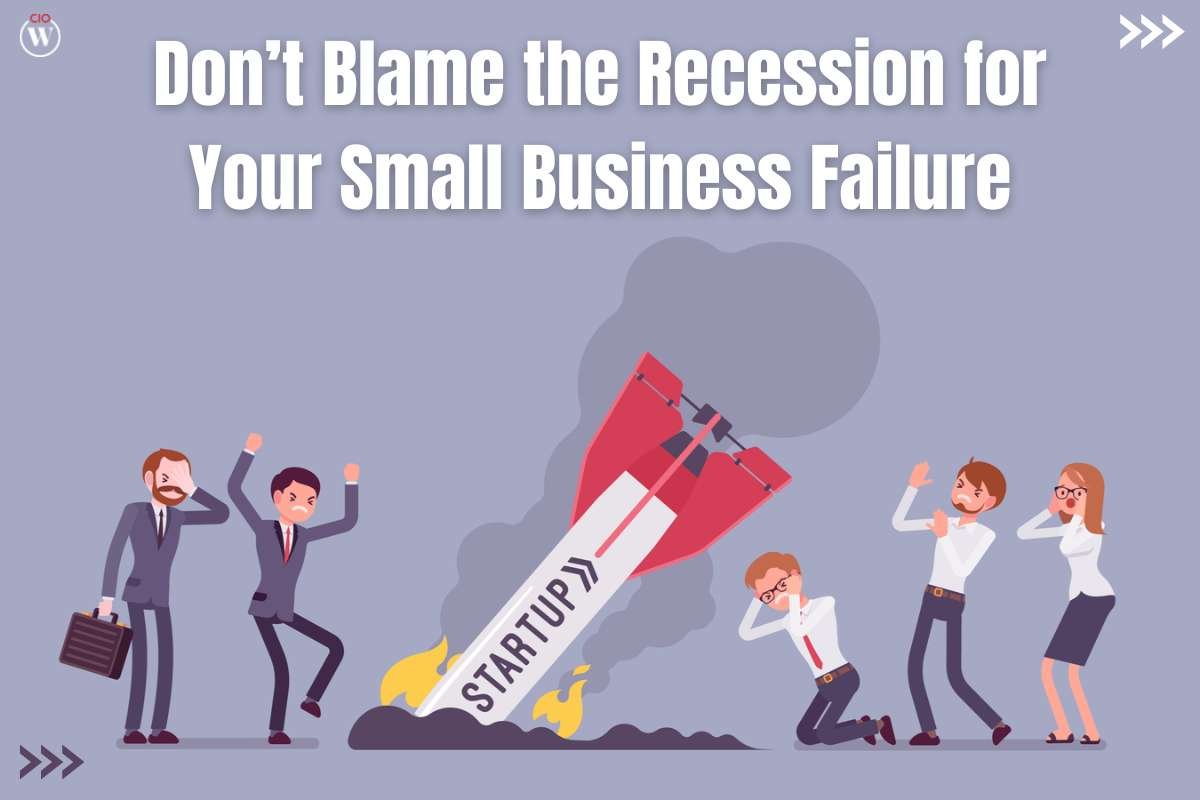The experience of launching a new venture, even a little one, may be thrilling and gratifying. But, it is not without its fair share of dangers and difficulties, particularly when the economy is in a downturn. It is true that economic downturns may have a detrimental effect on small enterprises, but placing all of the blame on the recession for the loss of your company is neither helpful nor an objective approach.
In the following paragraphs, we will discuss the impact of Recession on Small Businesses, and we will also give some advice for small business owners on how to manage tough economic times.
Why blaming the recession is problematic?
The impact of recession on Small Businesses might be problematic for a number of reasons. To begin, it may be a strategy for evading accountability for the choices you make about your company. Even while the economic downturn may have been a part of the challenges that your company is experiencing, it is essential that you recognize the other variables that contributed to your failure.
Have you, for instance, made bad judgments about your finances, or have you failed to adapt to the many shifts that have occurred in your industry? It may be challenging, but accepting responsibility for your errors is a necessary step in the process of gaining insight from your setbacks and enhancing your performance in the next business initiatives.
Second, pointing the finger at the recession as the cause of the problem might serve as an excuse for not taking any action. If you are under the impression that the economic downturn is the only factor contributing to the collapse of your company, you may feel as if there is nothing you can do to turn things around.

Nonetheless, there are many things that you can do to lessen the impact of recession on Small Business. Some examples of these things include reducing your expenses, diversifying the sources of your income, and searching for new clients or markets. Even if the economy is difficult, you may improve your chances of being successful in business by taking action and making adjustments to the way you approach running your company.
Lastly, placing blame on the recession might cause one to adopt a defeated mentality. If you think that the recession is a hindrance to the success of your company that cannot be overcome, you may experience feelings of discouragement and give up on your aspirations of being an entrepreneur. It is possible to succeed even in an economic situation that presents challenges, as shown by the fact that many successful enterprises have been established during times of economic instability. You may develop a successful company despite the difficulties presented by a recession if you keep a good attitude, concentrate on your capabilities, and demonstrate flexibility.
Tips for avoiding the impact of recession on Small Businesses;

It is vital to recognize the effect that economic downturns may have on small companies. Placing blame on the recession for the loss of your small company is not helpful; nonetheless, it is necessary to recognize the influence that economic downturns can have on small businesses. In order to successfully manage a recession, here are some pointers for owners to avoid the impact of recession on Small Businesses:
1. Reduce expenses
While the economy is in a downturn, it is essential to keep a close eye on your spending habits. You should look for methods to decrease expenses wherever you can, such as lowering your spending on marketing or negotiating cheaper rates with your various suppliers. If you find that you are unable to maintain the same level of business operations for much longer, one option to explore is scaling down the size of your company.
2. Diversify your revenue streams
Diversifying the manner in which your company makes money is one of the most effective strategies you can use to shield your company from the impact of recession on Small Business. If the bulk of your income comes from only one product or service, you might be putting your business in jeopardy if that product or service has a drop in demand during a period of economic contraction. Explore several means by which you might broaden the scope of your products and attract additional clients or consumers.
3. Seek out new customers or markets
When the economy is in a downward spiral, it might be difficult to hold on to the customers you already have. Explore several avenues that might lead to the acquisition of new clients or markets, such as broadening your internet presence or concentrating on a certain demography. You could also think about forming partnerships with other companies or organizations in the area if you want to attract new customers.

4. Be adaptable
When the economy is in a recession, the landscape of business may shift dramatically. It is essential to have a flexible mindset and be open to revising one’s company approach whenever circumstances warrant it. Always keep an eye on what’s happening in your sector, and be receptive to fresh perspectives and ideas to overcome the impact of recession on Small Businesses.
5. Stay positive
In conclusion, it is essential to have a good attitude and an optimistic outlook throughout a recession. It is crucial to retain a can-do attitude and concentrate on your talents and possibilities in order to avoid feeling disheartened and overwhelmed, despite the fact that it might be easy to feel these things. Keep in mind that many successful companies have been launched during tough economic times and that you can overcome the hurdles of a recession with hard work and commitment. In addition, keep in mind that many successful businesses have been started during difficult economic times.
Bottom line
It is neither helpful nor true to attribute the collapse of your small company to the current economic downturn. It is crucial to accept responsibility for your company’s choices and to take action in order to limit the effect of an economic downturn. This is true even though economic downturns may undoubtedly have a negative impact of recession on Small Business.
You may successfully manage a recession and develop a profitable company by decreasing your expenses, diversifying the sources of your income, searching for new clients or markets, being adaptive, and maintaining a good attitude. Keep in mind that being an entrepreneur is a journey full of highs and lows, and that failure is often a necessary step on the path to success.
Also read: Recession Buster – Stop Whining and Nagging, Start Looking for A Solution









